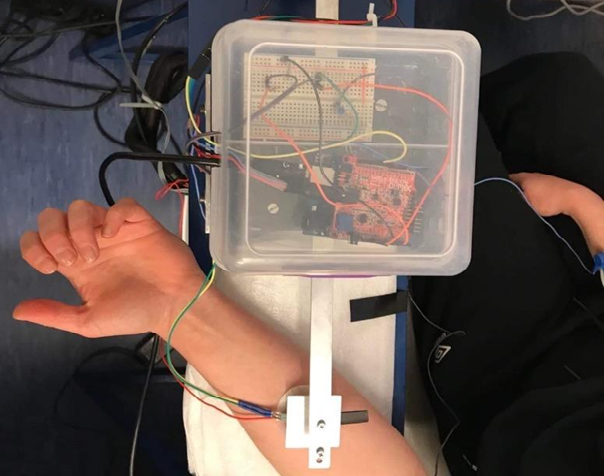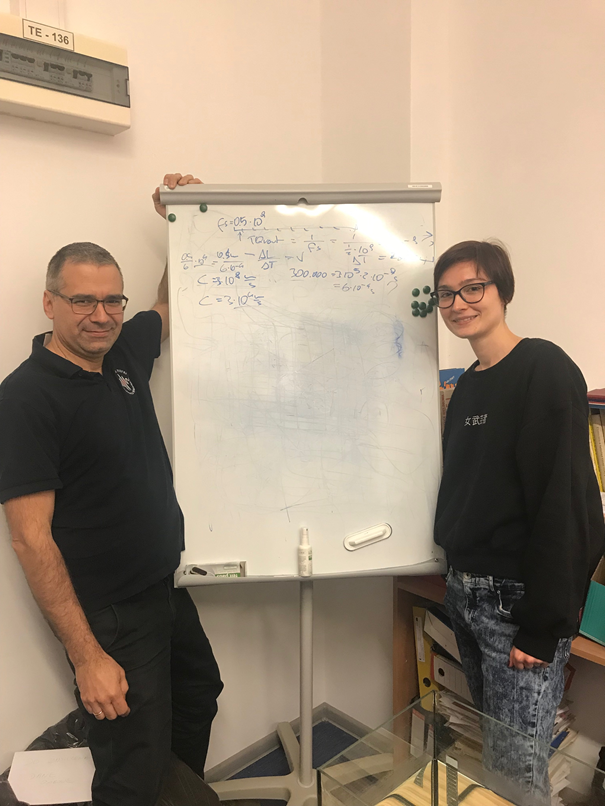Researchers at WUT create solutions for cardiology
There are plenty of scientists willing to carry out cardiology-related research at the Warsaw University of Technology. The results may save patients’ lives.
Three main tasks focused around experimenting and popularisation are underway as part of the research project "Better Protection of Cardiological Patients Against Arrhythmia Thanks to the Improvement of Assessment Criteria for Electrophysiological Final Phase of the T Wave". The first task, which is also the most technically challenging one, involves testing a group of cardiological patients whose electric potentials (EKG) and magnetic fields will be simultaneously measured by researchers. The action aims to define the dependency between various parameters characterising the T wave, based on the physical theory of biopotential. ‘Due to the Covid-19 pandemic, we had to postpone the implementation of this task,’ explains Dr Teodor Buchner from the Faculty of Physics of the Warsaw University of Technology. ‘Measurements are scheduled for Q1 of 2022,’ he adds.
This type of research is conducted very rarely because it requires unique equipment. So where did the idea of submitting this grant in the BIOTECHMED-2 competition, organised by Research Centre POB Biotechnology and Biomedical Engineering, come from?
‘Actually, we have the equipment required to conduct this research at the Warsaw University of Technology,’ explains Dr Buchner. ‘It is used by Dr Pęczalski’s team at the Faculty of Mechatronics at WUT. Our contribution as physicists includes our penchant for speculation and academic analysis. In these tests, we focus on constructing models and deeper understanding of the observed reality,’ explains the researcher.
The second task of the grant is carried out on a large American database called THEW, acquired from the University of Rochester. The team from the Faculty of Physics is researching cardiological patients to devise new diagnostic techniques.
When implementing research tasks, WUT scientists concluded that what they observed at the level of the EKG electrode was a signal with its own history. It is a signal that came out of the heart, went through some pathways, and spread all over the tissue with the help of various physical phenomena such as polarization. The researchers have managed to find a few such areas in which they can specify which pathways the signal takes and what the consequences for diagnostics are. ‘Currently, we are in the middle of work on a patent related to this test, which will hopefully become one of the grant outcomes,’ says Dr Buchner.
Cucumber in the service of science
Another aspect of the grant is the problem of the reliability of research on the volume of intracellular water reported by experimental cardiologists. WUT physicists are collaborating on this topic with the researchers from the Faculty of Chemistry at WUT. ‘Initially, we wanted to test animal tissues, but our fellow chemists suggested using a plant sample, which is easier to test,’ says Dr Buchner.
The test was conducted on a cucumber. ‘We tested the impact of the process of freezing and defrosting on the electric properties of the sample,’ explains the physicist. ‘The freezing process destroys the cellular structure. We observed the changes provoked by freezing which we can then interpret from the point of view of physics and create a new theory. We aim to join a dialogue with experimental cardiologists to become a solution provider for them,’ he says.
Extensive collaboration
Scientists at the Faculty of Physics do not exclusively collaborate with the Faculty of Mechatronics and Chemistry as part of the research. The subject of the grant has become popular enough to attract in total a dozen people working on it. ‘They include grant implementors, my master students, doctoral students, and adjuncts, among others,’ lists Dr Buchner. ‘During the grant implementation, we noticed that once an interesting subject turned up, it began to attract people of various academic status, frequently as volunteers,’ continues the researcher. ‘A doctoral student’s boyfriend, who got involved in the work because he liked the subject very much, is collaborating with us. There is even a doctoral student from the Faculty of Architecture, who worked on the visualisations and contributed a lot to the imagery of the phenomena occurring at the molecular level. The subject will become included in a book titled "Molecular Theory of Biopotential", which will be published this year by Oficyna Wydawnicza PW, also with the grant support. Good, interdisciplinary subjects which can be implemented within Priority Research Areas promote collaboration at WUT and facilitate collaboration both with the industry and doctors from Wolski Hospital and National Cardiological Institute in Anin, among others, who are the recipients of our research,’ adds Dr Buchner.
Scientific Club of Computer Physics at the Faculty of Physics also takes part in the research and supports the scientists in developing calculation threads.
The project "Improvement of criteria for electrophysiological assessment of terminal phase of T wave enhances antiarrhythhmic protection of cardiological patients” is funded within the research grant Research Centre POB Biotechnology and Biomedical Engineering under the program "Research University – Excellence Initiative", implemented at the Warsaw University of Technology.
Research team (including volunteers):
- Teodor Buchner, PhD, DSc, Faculty of Physics
- Kazimierz Pęczalski, DSc, Faculty of Mechatronics
- Professor Leszek Niedzicki, Faculty of Chemistry
- Dr Marta Kasprzyk, Faculty of Chemistry
- Michał Wierzchowski, MSc, Faculty of Mechatronics
- Agata Bonisławska, MSc, Faculty of Architecture
- Tomasz Gradowski, DSc, Faculty of Physics
- Mateusz Ozimek, MSc, Faculty of Physics
- Karolina Rams, MSc, Faculty of Physics
- Małgorzata Andrzejewska, MSc, Faculty of Physics
- Maryla Zajdel, BSc, Faculty of Physics
- Sebastian Wildowicz, MSc, Faculty of Physics
- Judyta Sobiech, MSc, Faculty of Physics
- Gabriela Janik, BSc
- Katarzyna Pawłowska
- Katarzyna Jon



